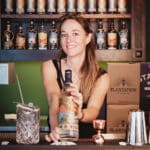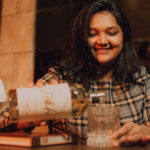La Martiniquaise-Bardinet Group Communication Director: DONATIEN FERRARI
TRL: Who is Donatien Ferrari?
I’ve been a wine and spirits enthusiast since I was 14 (that’s very French).
I’m from Paris but have strong roots in Corsica, a beautiful island between France and Italy. I’m also a father of 2 and a fan of Burgundy wines, barbecue, scuba diving, and cigars. I’m lucky enough to work for the independent, family-owned group La Martiniquaise Bardinet, which owns a collection of wineries and distilleries.
TRL: What does the rum mean for you? What made you fall in love with rum and when did it happen?
I could travel to the French West Indies, Martinique and Guadeloupe, during my youth. Even before I was old enough to drink rum, I was a longtime admirer of the local cuisine, music, and way of life. One of my favorite dishes is still to this day the”matoutou”, a crab and rice dish usually served at Easter.
Professionally, my first contact with rhum was an internship at Trois Rivière’s French distributor in mainland France, with a tasting of the 1954 vintage on the day I arrived… enough to get you in the mood!
Today, for me, rum is an important part of my work, but above all it’s about friendship and having a good laugh all over the world!
TRL: Three essential characteristics that define the rum according to your perspective.
History, terroir, and fun.
TRL: What is the most important contribution you have made in the rum industry?
In my humble capacity, I try to explain the particularities of pure cane juice rhums, a category that is still tiny outside French-speaking countries.
TRL: Benefits that the rum industry has given you.
The opportunity to spend time in the distilleries and meet some very talented people, such as Monsieur Marc Sassier, cellar master at Saint James, or Monsieur Fede, the organizer of US rum fests.
TRL: What’s another thing you are passionate about, besides rum? Why?
I will say wine because like in rum you have a lot of diversity, great terroirs, and a really strong cultural dimension. I started collecting wine when I was 14 and I still devote much of my free time to it.
TRL: What is your favorite place for drinking rum?
On the beach, with feet in the sand at sunset, or on a catamaran at 9 am for a ti-punch (aka decolaj / aka Take Off with Saint James Fleur de Canne, Depaz Papao or Bellevue 59°).
TRL: Favorite drink + Recipe
One drop of Saint James “Brut de Colonne” batch 1 on a Corsican oyster from the Diane’s lake.
TRL: Why is it important to educate the rum consumer?
Along with several other producers (from Barbados and Jamaica in particular), we are committed to transparency in the world of rum, and promote natural rums with no additives. However, the palates of many consumers are not used to this rather dry aromatic profile. I’ve got nothing against sweet rums – they’re often very good, and they’re often a good gateway into the world of rums – but in my opinion, a rum should be “naturally” sweet, with no external additions. Even if in business terms, things are very different… We also want to prove that very old rums can rival the best Cognacs and Single Malts, and those lucky enough to have tasted very old Neisson or J. Bally will agree with me!
TRL: Any tips to train the palate and taste a good premium rum?
With all due respect to my American friends, have a good-tasting glass! No plastic! And take your time…
TRL: How can the rum contribute to improving the crisis in some countries?
Along with tourism, rum is one of the main economies of many Caribbean islands. We are developing and investing heavily in spiritourism to develop the local and circular economy. Our local teams are proud to see that people come from all over the world to discover our know-how.
TRL: Is the commitment to sustainable development the key of success for the permanence of the rum industry in the world? Why?
Our rhum distilleries (Depaz and Saint James in Martinique, Bellevue and Bonne Mère in Guadeloupe and Rivière du Mât in Réunion) are all exemplary in terms of CSR. We practice sustainable agriculture with organic plots, we use sugar cane to produce green energy and we recycle all our waste.
We are proud to say that we work in harmony with our ecosystems.
TRL: Who would like to meet in the rum industry? What would you say to him/her?
I would like to meet an angel… because with all the angel shares we give them each year, I would appreciate a little something in return…
TRL: Plans you have when you leave the rum industry.
I’d like to retire to Corsica, go sailing, and spend time in my garden watching my tomatoes grow.
TRL: Why is the role of the bartender important in the rum industry?
Of course! The bartending community is always up for creating fabulous cocktails and letting their creativity run wild. In fact, we organize a bartender competition in 18 countries with the Saint James brand. Every year, it’s a great opportunity to share and exchange ideas.
TRL: What is your advice for new generations in the rum industry?
Be sustainable, don’t be afraid to innovate and create your own style and… Invest in packaging!
TRL: How can people learn more about you? Website? Social media page? I’m too old, I don’t have internet.
About The Author
Creative Director for EmpresasFH and Director of HOFFMANNdesign. Born and raised in Caracas, Venezuela, Mr. Hoffmann has been one of the most important designers for prestigious companies in South America, including Disney, Cartoon Network, Mattel among others.





